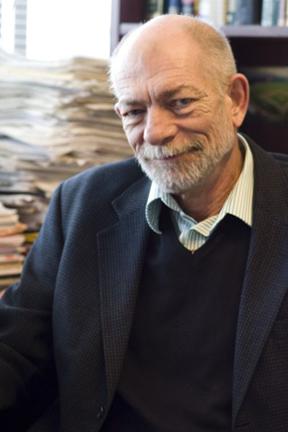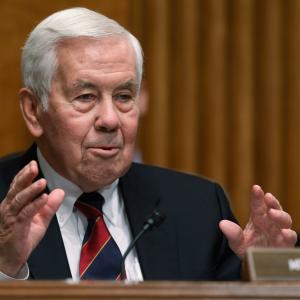
Duane Shank was Associate Editor for Sojourners magazine and was on the staff from 1995 to 2014.
Duane has been active as an organizer and administrator in the peace and justice movement for 35 years, beginning as a draft resistance and antiwar organizer during the Vietnam war. He has worked as a community organizer in the rural south, in interfaith coalitions, and in the nuclear weapons freeze and Central America solidarity movements of the 1980s. His positions have included Associate for the National Inter-religious Service Board for Conscientious Objectors; National Coordinator for the Committee Against Registration and the Draft; Deputy Director and Acting Executive Director for SANE/Freeze; and Research Fellow for the Institute for Policy Studies.
Duane attended Eastern Mennonite University. He is a Anabaptist/Mennonite, and currently an active member and serves on the worship leadership team of the Community of Christ ecumenical congregation in the Mt. Pleasant neighborhood of Washington, D.C. His views on faith and politics have been shaped by (among others), John Howard Yoder, Abraham Joshua Heschel, Martin Luther King, Jr., Dietrich Bonhoeffer, and Oscar Romero.
Duane is married to Ellen Kennel. They have a daughter, Celeste, a graduate of Goshen College, IN, the Medill School of Journalism at Northwestern University, and the University of Chicago Divinity School.
In addition to family, church, and work; his passions are baseball (Washington Nationals), blues (Buddy Guy and Stevie Ray Vaughan) and bluegrass music (Ralph Stanley), and barbecue.
Posts By This Author
In the Stacks, May 31, 2012
Among my must reads are the Sunday New York Times Book Review and other book reviews I come across in various media outlets. There are too many books being published that I would love to read, but just don’t have the time. So, I rely on reading book reviews as one way of keeping in touch with what’s being written.
Here are my picks in this week’s books of interest:
Money Unlimited
A good history in The New Yorker of attempts at regulating campaign finance leading to the Citizens United case before the Supreme Court and how Chief Justice Roberts orchestrated the decision:
"The decision followed a lengthy and bitter behind-the-scenes struggle among the Justices that produced both secret unpublished opinions and a rare reargument of a case. The case, too, reflects the aggressive conservative judicial activism of the Roberts Court. It was once liberals who were associated with using the courts to overturn the work of the democratically elected branches of government, but the current Court has matched contempt for Congress with a disdain for many of the Court’s own precedents."
Last evening, retired Justice John Paul Stevens, who led the dissent in the case, commented on it in a speech at the University of Arkansas. Asking why those with the most money are permitted to dominate the airwaves, he said:
"During the televised debates among the Republican candidates for the presidency, the moderators made an effort to allow each speaker an equal opportunity to express his or her views. Both the candidates and the audience would surely have thought the value of the debate to have suffered if the moderator had allocated the time on the basis of the speakers' wealth, or it they had held an auction allowing the most time to the highest bidder."
Yet thanks to the Court, that is essentially what we have in this election.
In the Stacks
Among my must reads are the Sunday New York Times Book Review and other book reviews I come across in various media outlets. There are too many books being published that I would love to read, but just don’t have the time. So, I rely on reading book reviews as one way of keeping in touch with what’s being written.
Here are my picks in this week’s books of interest:
The Cause
By Eric Alterman and Kevin Mattson, Reviewed by Jeff Shesol
Power and Constraint: The Accountable Presidency after 9/11
By Jack Goldsmith
Democracy’s Blameless Leaders: From Dresden to Abu Ghraib, How Leaders Evade Accountability for Abuse, Atrocity, and Killing
By Neil James Mitchell
Out of Order
The House of Representatives has been debating the defense authorization bill for the past two days, including more than 140 amendments. But this year’s version of the McGovern-Jones amendment calling for a faster withdrawal of U.S. troops from Afghanistan was not among them. Reps. Jim McGovern (D-MA) and Walter Jones (R-NC) have offered similar amendments for several years, steadily gaining votes. Last year, there 204 votes in favor, including 26 Republicans. Activists believed this year might see an even higher total, perhaps enough to pass. Rather than face that result, the Rules Committee simply ensured that it would not come to the floor for a vote.
CNN reported this morning two GOP congressional sources confirming that Republicans were concerned the amendment could pass. The only Afghanistan withdrawal amendment made in order was by Barbara Lee (D-CA), which would have essentially ended the war by limiting funding to the safe and orderly withdrawal of U.S. troops and military contractors from Afghanistan. It predictably failed on a 303-113 vote.
Both McGovern and Jones denounced the action. McGovern asking, "What is the Republican leadership afraid of? Are they afraid a bipartisan majority of this House will vote to follow the will of the American people and change our Afghanistan policy?" Jones added, "This is supposed to be the people's House - that means we listen to the people. How about listening to the 72% of those who say get out of Afghanistan?” The next opportunity will likely be the defense appropriations bill sometime this summer.
Apocalypse Fairly Soon
Paul Krugman looks at the European financial crisis and sees Apocalypse Fairly Soon.
Suddenly, it has become easy to see how the euro — that grand, flawed experiment in monetary union without political union — could come apart at the seams. We’re not talking about a distant prospect, either. Things could fall apart with stunning speed, in a matter of months, not years. And the costs — both economic and, arguably even more important, political — could be huge.
Pour Me Another Cup of Coffee
A new study conducted by the National Institutes of Health and AARP showed that coffee drinkers are likely to live longer. Lead researcher Neal Freedman of the National Cancer Institute says, “There may actually be a modest benefit of coffee drinking.”
The study included more than 400,000 people and found that “Compared to those who drank no coffee, men who had two or three cups a day were 10 percent less likely to die at any age. For women, it was 13 percent.”
In the Stacks, May 16, 2012
Among my must reads are the Sunday New York Times Book Review and other book reviews I come across in various media outlets. There are too many books being published that I would love to read, but just don’t have the time. So, I rely on reading book reviews as one way of keeping in touch with what’s being written.
Nuns on the Frontier
In the current controversy between the Vatican and U.S. religious women, a short history showing that it’s nothing new. Professor emerita of history Anne M. Butler tells the story:
In the 19th century, Catholic nuns literally built the church in the American West, braving hardship and grueling circumstances to establish missions, set up classrooms and lead lives of calm in a chaotic world marked by corruption, criminality and illness. Their determination in the face of a male hierarchy that, then as now, frequently exploited and disdained them was a demonstration of their resilient faith in a church struggling to adapt itself to change.
Troop Withdrawal: Easier Said Than Done
In his successful run for president of France, one of Francois Hollande’s campaign promises was to withdraw all French troops from Afghanistan by the end of this year. Now that he’s taken office, he’s discovering that was easier to promise than it will be to accomplish.
Military specialists are advising him that it is “next to impossible to transport all combat troops and their equipment back to France by the end of the year.” A number of other countries, faced with opposition at home to their war involvement, are also interested in speeding up withdrawals. It should make for interesting discussions at this weekends' NATO Summit.
Showdown in Europe
In his inaugural address today, new French President Francois Hollande called for a European pact for growth to balance out German-driven austerity measures.
"I will propose to our partners a pact that will tie the necessary reduction of our public debt to the indispensable stimulation of our economies."
But, according to Spiegel Online,
Europeans hoping that mounting international opposition will make [Chancellor Merkel] drop her austerity plan to save the euro -- a policy that is causing so much pain in ailing economies like Greece and Spain -- are likely to be disappointed, say analysts in Germany.
Coming Home: The New Afghan Mission
Gen. John Allen, the U.S./NATO commander in Afghanistan, is reorienting the military mission in Afghanistan. As U.S. troops leave, Afghan troops must take the lead.
Faced with an order from President Obama to withdraw 23,000 troops by the end of the summer, and the prospect of further reductions next year, Allen is hastily transforming the U.S. military mission in Afghanistan. Instead of trying to continue large U.S. counterinsurgency operations for as long as he can, he is accelerating a handover of responsibility to Afghan security forces. He plans to order American and NATO troops to push Afghans into the lead across much of the country this summer, even in insurgent-ridden places that had not been candidates for an early transfer.
A Gift for Mother’s Day
For those of us whose mothers have gone to be with God, Mother’s Day is a poignant reminder of loss. It’s a day of prayer, reflection and thanksgiving for our mothers, for the love and nurture we received from them. And it can also still be a day of gift-giving, now in their memory rather than to them.
Some years ago I met the founder of what has become one of my favorite ministries. Bridge of Hope is a national ministry, now with affiliates it serves in seven states. Its model of service is to develop a partnership between a church-based mentoring group, professional staff, and a homeless or at-risk single mother and her children. The goal is to empower women to achieve housing, financial stability through employment, friendship and support, personal growth and wholeness. It’s an inspiring example of how the combination of loving, nurturing support coupled with material assistance can change lives.

Bishops Assess Budget
The U.S. Catholic Bishops weighed in on the budget again yesterday. A letter signed by Bishop Stephen E. Blaire, Chairman of the Committee on Domestic Justice and Human Development, and sent to Members of the House of Representatives repeated the “moral criteria” by which they assess the budget:
1. Every budget decision should be assessed by whether it protects or threatens human life and dignity.
2. A central moral measure of any budget proposal is how it affects the lives and dignity of “the least of these” (Matthew 25). The needs of those who are hungry and homeless, without work or in poverty should come first.
3. Government and other institutions have a shared responsibility to promote the common good of all, especially ordinary workers and families who struggle to live in dignity in difficult economic times.
After specifically noting the Child Tax Credit, Supplemental Nutrition Assistance Program (food stamps), and the Social Services Block Grant; the bishops concluded,
“…the Catholic bishops join other faith leaders and people of good will urging you to protect the lives and dignity of poor and vulnerable families by putting a circle of protection around these essential programs and to refrain from cutting programs that serve them.”
Reactions to Richard Lugar's Primary Loss
Sen. Richard Lugar (R-IN) was defeated for renomination yesterday in the Indiana Republican primary. During 35 years in the Senate, Lugar had built a reputation as a conservative, but one who was willing to work across the aisle, especially on issues of foreign policy and nuclear non-proliferation. That willingness became a major attack point for his opponent, State Treasurer Richard Mourdock, who pledged to end attempts at bipartisanship by pushing a more conservative agenda. “I have a mindset that says bipartisanship ought to consist of Democrats coming to the Republican point of view,” he said this morning.
Lugar’s concession statement was unyielding:
"If Mr. Mourdock is elected, I want him to be a good Senator. But that will require him to revise his stated goal of bringing more partisanship to Washington. He and I share many positions, but his embrace of an unrelenting partisan mindset is irreconcilable with my philosophy of governance and my experience of what brings results for Hoosiers in the Senate. In effect, what he has promised in this campaign is reflexive votes for a rejectionist orthodoxy and rigid opposition to the actions and proposals of the other party. His answer to the inevitable roadblocks he will encounter in Congress is merely to campaign for more Republicans who embrace the same partisan outlook."
Here are a few of today’s reactions.
Bluegrass Mama: Watch, Sing, Pray
 From the heart of Bluegrass, songs about (and by) mothers.
From the heart of Bluegrass, songs about (and by) mothers.
Johnny Cash, June Carter Cash and family, "Can the Circle Be Unbroken?"
In the Stacks, May 8, 2012
Among my must reads are the Sunday New York Times Book Review and other book reviews I come across in various media outlets. There are too many books being published that I would love to read, but just don’t have the time. So, I rely on reading book reviews as one way of keeping in touch with what’s being written.
Here are my picks in this week’s books of interest.
'Mistaken' Deaths
How many more times do we have to read a story like this one?
The American military claimed responsibility and expressed regret for an airstrike that mistakenly killed six members of a family in southwestern Afghanistan, Afghan and American military officials confirmed Monday. The attack, which took place Friday night, was first revealed by the governor of Helmand Province, Muhammad Gulab Mangal, on Monday.
If it is the U.S. intention to win over the Afghan people, this is exactly how not to do it.
The Challenge
Glenn Kessler, writer of the Washington Post Factchecker column, issues a challenge to President Obama and Gov. Mitt Romney:
"With the presidential election looming in exactly six months, I would like to issue a challenge to you both: Give at least one campaign speech, on a substantive policy issue, lasting at least 15 minutes, that does not contain a single factual error or misstatement. That means no sugar-coating of your record, no exaggerated claims about your opponent’s record, and no assertions that are technically true but lack crucial context."
I’m not holding my breath for the challenge to be accepted.
'Four Dead in Ohio': Forty-two Years Later

The 1971 Pulitzer Prize-winning photo by John Paul Filo of the Kent State Shootings. Via Wylio http://bit.ly/IJoqIS.
May 4, 1970 -- 42 years ago today -- was the day protesting the war in Vietnam became serious.
On April 30, 1970 President Nixon had announced an invasion of Cambodia, seeking to destroy North Vietnamese and National Liberation Front operations in the border area. Protests spontaneously broke out at universities all over the country.
On May 4, National Guardsmen fired on a group of protesting students at Kent State University in Ohio, killing four and wounding nine. Jeff Miller, Allison Krause, Bill Schroeder, and Sandy Scheuer became casualties of the war. A presidential commission later concluded that the shooting was "unnecessary, unwarranted, and inexcusable."
Update: Obama in Afghanistan
Presidents Obama and Karzai have signed in Kabul a strategic partnership agreement between the two countries.
The Associated Press reports:
“The partnership spells out the U.S. relationship with Afghanistan beyond 2014, covering security, economics and governance. The deal is limited in scope and essentially gives both sides political cover: Afghanistan is guaranteed its sovereignty and promised it won't be abandoned, while the U.S. gets to end its combat mission in the long and unpopular war but keep a foothold in the country. The deal does not commit the United States to any specific troop presence or spending. But it does allow the U.S. to potentially keep troops in Afghanistan after the war ends…”
“At a signing ceremony in Kabul with Afghan President Karzai, Obama said the agreement paves the way for 'a future of peace’ while allowing the United States to ‘wind down this war.’ Karzai said his countrymen ‘will never forget’ the help of U.S. forces over the past decade.”




